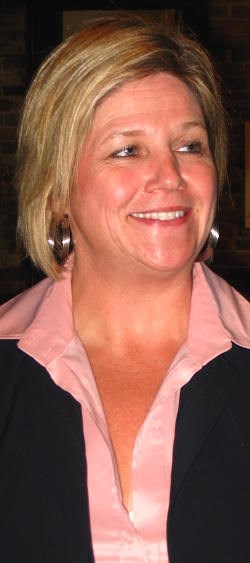It's not about how to get more votes, says Andrea Horwath, leader of the Ontario New Democratic Party.
It's about how we support people in what they're doing.
Horwath was wrapping up a heart-to-heart with about two dozen Saultites at the Arcadia Coffee Shop.
She sat down with Sault MP Tony Martin and a group of locals this week to discuss the role of women and youth in politics.
And, she was treated to some brilliant ideas from some of the Sault's finest minds.
One young woman, Katie Elliot, talked about her time job-shadowing a Conservative caucus member.
"I was very uncomfortable," she said. "They called me sweetie."
Elliot talked about feeling like her ideas were not taken seriously, mainly because she was young and female.
She said she felt angry and humiliated but didn't speak up because she was afraid to be branded as one of those bra-burning feminists.
"You know," she said. "That horrible 'f' word."
Gayle Broad shared her experiences with the feminist movement in the sixties and seventies, and about being happy to be a woman.
"My whole generation claimed that word 'feminist' as a way of expressing who we were, because we did believe in equality and we realized that we did not want to be men," she said.
Broad explained that the term 'women's libber' had taken on negative connotations for many and that the term 'feminist' was adopted to clarify that women didn't want to be men.
They just wanted as much respect and validity as men.
Jennifer Rose said that women still want the same things, but society has now assigned those negative and fearful connotations to the term 'feminist.'
Horwath and Sarah Broad both said it's very important that women and youth not allow themselves to be patronized, minimized or dismissed.
"We need to learn about gender inequality," Sarah said. "Right now it's being talked about like it happens out there somewhere but not here and now."
Horwath agreed, saying women must be prepared to call it out when they are belittled or minimized because they are female.
She shared a story about beginning her working life as an organizer for a legal clinic.
She became involved in municipal politics while Mike Harris' Conservative party was in power in Ontario and began to download responsibilities onto municipalities.
In 1997, at the age of 35, Horwath found herself one of the youngest and one of just a few women councillors in the City of Hamilton.
"I found it was very paternalistic," she said. "From men and women, I kept hearing that I was too young and that it wasn't my turn. I was told I should wait until I was older, even though there were male councillors younger than I."
She said that another female councillor told her that she decided to wait to get into politics until her children were older so she could be at home with them when they were young.
Like she should.
"It was hard to break through," Horwath said. "But your voice is important and you can make changes but sometimes it takes time."
Emily Colombo agreed, saying education made the difference for her.
Colombo found confidence in her voice and a taste for politics at university but hasn't always had a good experience with it.
"Sometimes when I bring ideas to the table, I feel like they just flow through people, like they just don't even hear me," she said. "It's hard to have the confidence to engage in political discussions, especially when you have the double whammy of being both a woman and young."
Horwath said she's seen young people and women belittled or personally attacked for expressing their ideas.
"When they try to engage they get minimized, patronized," she said. "We pat them on the head and say 'you're not ready yet.'"
Genesio Paciocco told Horvath that believes that when people feel the need to attack a person, it's usually because they can't find a weakness in the person's argument to attack.
A young man named Dustin said it's sad that this is still an issue.
"My ideas often differ from other men's ideas," Dustin said, explaining that just because two men have different ideas doesn't make one superior to the other.
"Equality is strongly there [for women]," Dustin said. "What's missing is equity."
A woman named Michelle agreed, saying people must first respect each other as people, then as people who are female or male, young or old, have an illness or another challenge.
Gayle Manley said she believes more women would get involved in politics if it were more issue-oriented and less confrontational.
She said the atmosphere of partisan politics is counter-productive and many women just don't want to waste their energy in such an ineffectual pursuit.
Emily Colombo agreed, pointing out that she didn't want to restrict herself to party loyalty above personal beliefs or her positions on issues.
"You have to find ways to become rooted in your story and to have integrity," said Tony Martin as the discussion wound down. "We evolve and we find like-minded people to hook up with."
Horwath took her lesson about finding ways to support people doing what they do on the road to Matthews Memorial Hospital on St. Joseph Island and also to a Chiefs of Ontario gathering at the Rankin Arena.
The NDP leader said she'd like to see this sort of discussion take place in other ridings as well.
